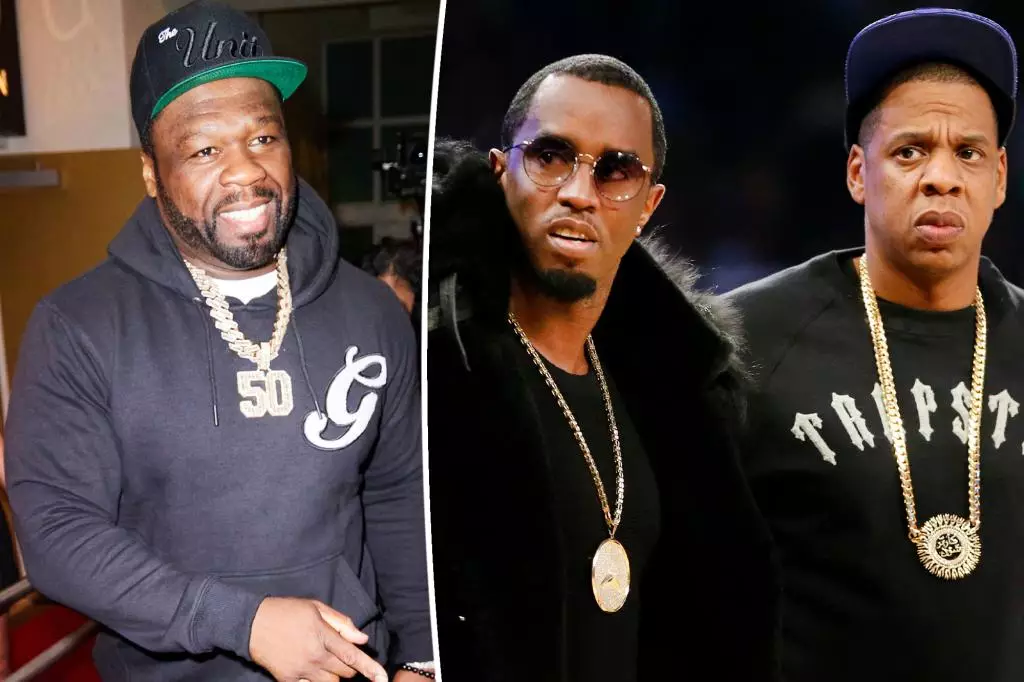In the ever-evolving world of hip-hop, few relationships generate as much intrigue as those between its leading figures. Recent social media antics have thrust 50 Cent into the spotlight, where he unleashed his signature blend of humor and biting commentary aimed at Jay-Z’s enduring friendship with Sean “Diddy” Combs. The “In da Club” rapper took to Instagram to share a series of nostalgic photos featuring Jay-Z and Combs, cleverly juxtaposed with the soulful track “Just the Two of Us” by Bill Withers. His caption, laced with sarcasm, provocatively asked, “Friends till the end, Jay you still there?”
50 Cent’s jab is not just mere jest; it throws back to the volatile history between these artists. By referencing an infamous incident involving Kid Cudi, who allegedly faced violent repercussions over his relationship with Combs’ former partner, 50 Cent encapsulates the dangerous blend of loyalty and rivalry that defines the hip-hop landscape. The quoted lines carried a double meaning, casting light on Combs’s troubling past, which now beckons attention due to serious allegations involving physical abuse and sexual misconduct.
The Implications of Allegations
The legal trouble surrounding Combs is both shocking and illuminating. Ventura’s lawsuit—accusing him of severe abuse—paints a grim picture of violence intertwined with the glitz of the music industry. When these allegations emerged, they not only disrupted the public’s perception of Combs but also raised questions regarding the responsibility influential figures have in maintaining their reputations amid scandal. With Cudi’s spokesperson corroborating Ventura’s claims, there’s a palpable tension in the air, forcing people to reassess their views on longstanding alliances within the industry.
Interestingly, 50 Cent has built a reputation for calling out the wrongdoings of his peers. He has previously targeted Combs’ actions and character, bringing a relentless fervor to his criticisms. His decision to utilize humor in addressing something so serious serves as a coping mechanism for both him and his audience, but it simultaneously magnifies the complexities of the ongoing discussion about violence, misogyny, and accountability in hip-hop.
Humor vs. Responsibility
Yet, there lies a delicate balance in 50 Cent’s approach. While his comedic style resonates with many, it also risks trivializing very real issues. The intersection of humor and serious allegations can desensitize audiences, potentially diluting the severity of genuine concerns. By wrapping allegations against Combs in this humorous narrative, 50 Cent gives the public a chance to engage with the subject matter without the heavy burden of its seriousness. However, this approach is also fraught with danger as it may inadvertently undermine the traumas faced by survivors of violence.
In addition to targeting Combs, 50 Cent has not shied away from involving Jay-Z in the conversation. With the latter denying all allegations and actively defending his reputation, the unfurling drama places the focus squarely on the characters involved. 50 Cent’s critiques not only ignite existing rivalries but also add layers to the dialogue surrounding accountability in their unique environment.
As the stakes rise, fans and industry insiders alike will watch closely to see how this saga develops. From the bravado of packed halls at concerts to the stark reality of courtroom proceedings, hip-hop continues to navigate the challenging terrain of celebrity and consequence. The dynamic between 50 Cent, Jay-Z, and Combs serves as a telling reflection of an industry grappling with its own moral complexities, leaving us to question where loyalty stands in the face of accountability.
